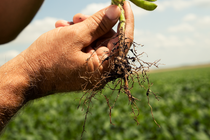Media
SCN Action Month returns: BASF and The SCN Coalition champion SCN education and management
RESEARCH TRIANGLE PARK, NC, October 1, 2025 – For the fifth year, BASF Agricultural Solutions and The SCN Coalition are partnering for SCN Action Month. Throughout October, the organizations will provide farmers with the latest insights, tools and resources to effectively manage soybean cyst nematodes (SCN) and protect soybean yield potential heading into the 2026 growing season.
SCN remains the leading cause of soybean yield loss in North America. It is present in most soybean-producing regions and continues to spread. Recent field data show that 50-65% of acres tested are experiencing elevated SCN levels. Left unmanaged, SCN can silently reduce yields and increase plant vulnerability to costly diseases such as sudden death syndrome (SDS) and red crown rot. In the U.S. alone, SCN contributes to more than $1.5 billion in annual yield losses[1].
“SCN is one of the most persistent challenges farmers face because it reduces yield without showing clear symptoms above ground,” says Jeremiah Mullock, BASF Seed Treatment Product Manager. “Often referred to as a silent yield robber, SCN is easy to overlook, and many farmers may not realize they have it or may underestimate its impact.”
Soil testing is the first step in uncovering the problem. According to Dylan Mangel, Plant Pathologist at The University of Nebraska-Lincoln, “After harvest is the most common and often convenient time to test soil for SCN, but you can pull a soil sample any time of the year. If the nematodes are there, you’re likely to find them.”
Identifying SCN in a field is only the first step. Long-term management depends on regular monitoring. Mangel notes, “If you want to know whether your SCN management is working, be consistent about when you sample year after year. BASF and The SCN Coalition recommend that farmers collect soil samples after harvest to check population levels and plan strategies for the season ahead. Sampling is simple and sending them to a diagnostic lab will confirm the presence and severity of SCN.”
In 2024, BASF analyzed 6,000 soil samples from across the United States. More than 80% tested positive for SCN, and more than half showed damaging levels. The data underscores both the widespread nature of SCN and the urgent need for farmers to implement effective prevention and management strategies.
Several proven practices can help farmers manage SCN, including:
- Collecting soil samples at the same time each year to identify SCN presence and levels
- Rotating crops to disrupt SCN lifecycles
- Planting SCN-resistant soybean varieties
- Using effective seed treatments for added protection
ILEVO® seed treatment remains a trusted solution, offering protection against both SCN and SDS. By reducing stress from SCN feeding and safeguarding against SDS, ILEVO seed treatment helps support healthier roots, stronger stands and more resilient soybean crops.
BASF invests more than $1 billion annually in agricultural research and innovation, with more than 250,000 acres dedicated to research plots in 2025 alone. The company’s participation in SCN Action Month reflects an ongoing commitment to supporting farmers who are doing the Biggest Job on Earth.
BASF and The SCN Coalition encourage farmers to take action this October by collecting soil samples, sending them to a lab for testing and consulting BASF field representatives about SCN management strategies. To learn more, visit SCNActionMonth.com or SCNFields.com. Receive up-to-date news releases from BASF via push notification on your smartphone by registering at basf.com/pushnews.
Always read and follow label directions. ILEVO is a registered trademark of BASF. © 2025 BASF Corporation. All Rights Reserved.
About BASF’s Agricultural Solutions division
Everything we do, we do for the love of farming. Farming is fundamental to provide enough healthy and affordable food for a rapidly growing population, while reducing environmental impacts. That’s why we are working with partners and experts to integrate sustainability criteria into all business decisions. With €919 million in 2024, we invest in a strong R&D pipeline, combining innovative thinking with practical action in the field. Our solutions are purpose-designed for different crop systems. Connecting seeds and traits, crop protection products, digital tools and sustainability approaches, to help deliver the best possible outcomes for farmers, growers and our other stakeholders along the value chain. With teams in the lab, field, office and in production, we do everything in our power to build a sustainable future for agriculture. In 2024, our division generated sales of €9.8 billion. For more information, please visit www.agriculture.basf.com or our social media channels.
About BASF
BASF Corporation, headquartered in Florham Park, New Jersey, is the North American affiliate of BASF SE, Ludwigshafen, Germany. BASF has approximately 16,000 employees in North America and had sales of $19.7 billion in 2024. For more information about BASF’s North American operations, visit www.basf.com/us.
At BASF, we create chemistry for a sustainable future. Our ambition: We want to be the preferred chemical company to enable our customers’ green transformation. We combine economic success with environmental protection and social responsibility. Around 112,000 employees in the BASF Group contribute to the success of our customers in nearly all sectors and almost every country in the world. Our portfolio comprises, as core businesses, the segments Chemicals, Materials, Industrial Solutions, and Nutrition & Care; our standalone businesses are bundled in the segments Surface Technologies and Agricultural Solutions. BASF generated sales of €65.3 billion in 2024. BASF shares are traded on the stock exchange in Frankfurt (BAS) and as American Depositary Receipts (BASFY) in the United States. Further information at www.basf.com.
[1] 2015-2021 Crop Protection Network annual soybean cyst nematode (SCN) estimated yield loss at commodity price ($14/bu.)

